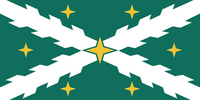Territorial Defence Forces: Difference between revisions
| Line 118: | Line 118: | ||
===Permanent Home Guard=== | ===Permanent Home Guard=== | ||
*[[File:AtrassicaFlag.png|30px]] Territorial Defence of [[Atrassica]] | |||
*[[File:SydonaFlag.png|30px]] Territorial Defence of the [[Sydona Islands]] | *[[File:SydonaFlag.png|30px]] Territorial Defence of the [[Sydona Islands]] | ||
*[[File:MelianIslesFlag.png|30px]] Territorial Defence of the [[Melian Islands]] | *[[File:MelianIslesFlag.png|30px]] Territorial Defence of the [[Melian Islands]] | ||
Revision as of 14:32, 8 February 2024
| Territorial Defence Forces Skírēvikulix Sidhrahérsanya | |
|---|---|
 | |
| Active | 2026 AD-present |
| Country | |
| Allegiance | Marble Emperor |
| Role | Military reserve Homeland defence Airlift support Civil defence Military police |
| Part of | Kiravian Armed Forces |
| Patron | Justin Martyr |
| March | Seven Nation Army |
| Mascot(s) | Home Guard potato |
| Commanders | |
| Field General | N. Arhénius Kalaxin |
| Commander-in-Chief | Adheritus Ilkaśvar |
| Insignia | |
| Flag |  |
| Shoulder Insignia | |
The Territorial Defence Forces are a component of the Kiravian Armed Forces and organised militia of the Kiravian Federacy. Units of the TDF are organised on a provincial basis and function as provincial militia under command of regional governors during peacetime, but are trained and equipped according to Federal standards and financed largely out of the Federal defence budget, and can be brought under federal command during wartime or by decree of the Prime Executive exercising Imperial prerogative in support of federal military operations. The Territorial Defence Forces form the primary reserve force in support of the Kiravian Army and Kiravian Airforce, each of which also maintains a retired reserve of separated officers and NCOs on a transitional basis.
Although local and provincial militia have been summoned to Imperial or National service in Kiravia since time immemorial, the Territorial Defence Forces took their current form under the Territorial Defence Act of 2026, superseding the Provincial Forces Coördination System as part of the comprehensive post-Deluge military reforms undertaken by the Ilkaśvar administration.
Background
[Predecessors]
[Reform]
Provincial navies, which supplement or regionally substitute the coast guard capabilities of the Maritime Cutter Service, particularly in Sarolasta, Sydona, and the Overseas Regions, were outside of the scope of the reform.
[Constitutional basis]
According to the Fundamental Statute of the Kiravian Federacy, power of the sword resides in the Emperor in the right of the provinces except where the Fundamental Statute itself has elevated it to the Emperor in the right of the Federacy for purposes of national defence, the enforcement of federal law, and extension of the Emperor's peace to the sea and sky. Kiravian states have the right to maintain their own military forces, and furthermore all provinces have the duty to maintain a well-regulated militia and to provide military manpower for the defence of the Federacy in times of war. The Fundamental Statute also reserves to the provinces primary responsibility for maintaining civil defence and public order within their territory, including the mobilisation of militia for these purposes.
Mission Profile
The paramount mission of the Territorial Defence Forces as a federalised collective is the defence of Great Kirav and the other major landmasses of the Kiravian Federacy from foreign invasion or domestic insurrection. In the case of the Kiravian metropole, foreign invasion is acknowledged to be only a remote possibility in the contemporary threat environment, given the Federacy's nuclear arsenal and the isolated geography of Great Kirav. However, metropolitan Territorial Defence Forces nonetheless train for this contingency, and their readiness in the face of such a threat is deemed an important element of strategic deterrence. In certain overseas colonies, on the other hand, particularly Sydona, more credible threats of foreign invasion exist, and the regional Territorial Defence Force is crucial to Kiravian defence planning.
Ground combat units of the Territorial Defence Forces are generally light infantry (majority) or mechanised infantry (minority). According to the environmental conditions of their home provinces, some TDF units specialise in environment-specific warfare capabilities, most commonly mountain- or high-latitude warfare.
[Environmental and technical expertise]
The Territorial Defence forces of Koskenkorva, Intravia, Vôtaska, Erusta, the Northwest Territory, and Thýstara include moose cavalry units, which are used mainly for domestic security patrol operations. However, the TDF of Thýstara and the Northwest Territory have been assigned overseas to assist with border security in the East Arctic Mandate and to train the Mandate's own moose gendarmes.
[Home front support to federal operations]
[Civil Defence]
[Lawn Order]
Administration
Administrative responsibility for the Territorial Defence Forces is shared between the federal and provincial governments.
Most Kiravian provinces have a cabinet-level Defence Secretariat or Secretariat of Militia Affairs or equivalent that is responsible for the day-to-day administration and readiness of the provincial armed forces. In some provinces, particularly overseas, civilian responsibility for territorial defence falls directly to the Governor. The highest-ranking commissioned officer of a province's territorial defence forces goes by the title of Captain-General and usually holds the rank of major general, though smaller provinces may have lower-ranking Captains-General.
List of Territorial Defence Forces
Deployable as Battlegroups
|
Æonaran Battlegroup
|
Farravonian Battlegroup Mid-Oceanic Battlegroup |
Southern Battlegroup
|
Individually Deployable
 Territorial Defence of Eusa
Territorial Defence of Eusa Territorial Defence of Iunan
Territorial Defence of Iunan Territorial Defence of Ixikéa-Qihuxia
Territorial Defence of Ixikéa-Qihuxia Territorial Defence of Kiorgia
Territorial Defence of Kiorgia Army of Knassania (includes air wing)
Army of Knassania (includes air wing) Saxalin Islands (Air wing only)
Saxalin Islands (Air wing only) Territorial Defence of Sixua
Territorial Defence of Sixua
Permanent Home Guard
 Territorial Defence of Atrassica
Territorial Defence of Atrassica Territorial Defence of the Sydona Islands
Territorial Defence of the Sydona Islands Territorial Defence of the Melian Islands
Territorial Defence of the Melian Islands Territorial Defence of the Krasoa Islands
Territorial Defence of the Krasoa Islands Saxalin Islands (Ground force only)
Saxalin Islands (Ground force only)
Not Deployment-Ready
 Kyllera Republican Guard
Kyllera Republican Guard